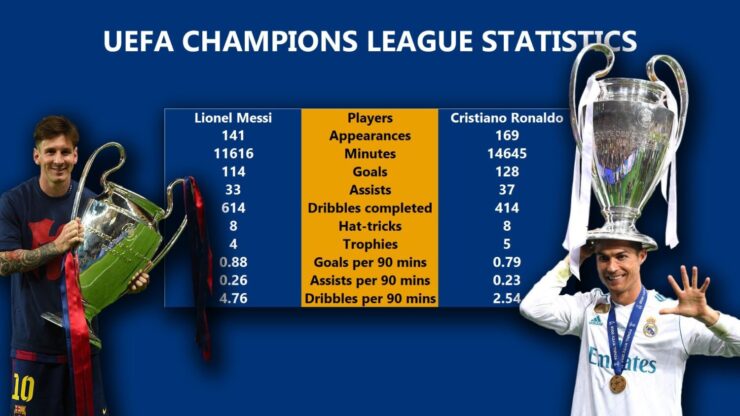The UEFA Champions League is the most prestigious club competition in European football. As the top teams from across the continent battle for continental glory, there are many factors for bettors to consider when analyzing matches and placing wagers. If you are into betting, here are some of the key UEFA Champions League betting trends and statistics to examine:
Recent Form

One of the most fundamental betting trends to assess is a team’s recent form coming into a Champions League match. Analyze their last 5-10 domestic league and cup matches to gauge performance levels. Teams in strong form with a run of wins tend to carry momentum and confidence that can translate to the Champions League. Conversely, clubs in poor form struggle to raise their game in Europe.
Pay close attention to trends like goals scored, goals conceded, shot totals, and expected goals (xG) rather than just results. A team scraping narrow 1-0 wins despite poor underlying numbers may see their luck run out in the Champions League. While a team dominating matches but falling short on points due to bad luck may be primed for improved results in Europe.
Head-to-Head Record
The historical head-to-head record between two clubs is always worth analyzing. Some teams simply have a psychological edge or tactical matchup advantage against certain opponents. If a club has dominated their upcoming Champions League opponent in recent meetings, it can point to a potential betting edge.
Look beyond just wins and losses in the head-to-head record. Analyze trends like how many goals each team has scored in past meetings and whether certain players have an excellent scoring record against that opponent. These trends can prove useful for proposition bets on players to score.
Home and Away Performance

Given the two-legged knockout format of the Champions League knockouts, assessing home and away form is crucial. Some teams are virtually unbeatable at home but struggle on the road. Other clubs have proven themselves capable of getting results away from home against elite European opposition.
Look at recent home/away splits in league play as a guide. But also analyze how teams have performed on the road in the Champions League in previous seasons, as playing in a raucous away stadium in Europe is very different from domestic matches. Road wins in the Champions League knockout phase are especially impressive.
Injuries/Suspensions
Squad availability plays a huge role in the Champions League. The depth of talent needed to compete on multiple fronts means that injuries and suspensions can significantly impact a club’s chances.
Monitor injury reports and potential return dates for key players. Pay close attention to injuries to pivotal players like strikers and playmakers. Also research suspension lists and whether key players will miss upcoming Champions League matches due to yellow/red card accumulation.
Statistical Trends

The Champions League is a competition between elite clubs, so margins are razor thin. Analyzing key statistical trends can uncover betting value opportunities.
Look at statistics like possession, passing accuracy, shots per game, and expected goals to identify which teams dictate play and create dangerous chances. See if certain teams are overperforming or underperforming these underlying numbers to spot regression candidates.
Also analyze trends like goals scored in the first half, second half, and from set pieces. Whether a club scores early or late, at home or away, and how they score their goals can reveal betting insights.
UCL Experience
Experience matters in the high-pressure environment of the Champions League. Teams and players who have been there before tend not to get overwhelmed by the big stage.
Research how many Champions League campaigns a club’s current squad and manager have under their belt. Squads with many players making their first Champions League appearance can struggle to manage their emotions.
Similarly, look at whether star players have delivered in the Champions League previously. Unproven stars may falter under the bright lights while veterans often relish the big stage.
Situational Factors
Sometimes the trends and statistics only tell part of the story. Make sure to assess situational factors for each Champions League match.
Consider whether a manager is likely to rotate their squad due to fixture congestion, or if they will put out a first-choice XI. Are key players being rested for an upcoming league match? Has the club already clinched knockout qualification or been eliminated?
Injuries, suspensions, and squad rotation must be accounted for when interpreting statistical trends as well. The expected style of play and lineup decisions can sway betting decisions.
Odds Movement

Tracking line movement and how the betting market reacts to news and trends is insightful. Substantial Champions League odds movement towards one team or the other is often an indicator of sharp money having an edge.
Follow injury news, squad announcements, and betting percentages on sites like Oddschecker and https://ivibet.com/hu to spot significant moves toward one side. Fading the public and following sharp action is an advanced betting strategy that can pay dividends.
Gut Instincts
Even with all the statistics, trends, and situational factors, sometimes it comes down to the gut feel of an experienced bettor. The betting markets are not always efficient in pricing Champions League matches.
Trust your instincts when you notice obvious value opportunities. If your read on a team is much higher than the market’s perception, don’t be afraid to trust your own analysis and back your judgement. Just make sure it is an informed assessment not just a hunch.
By blending together all these UEFA Champions League betting elements, the key trends and statistics can guide your analysis while experience and instincts help make the final call. This comprehensive approach will put you in a strong position to find value bets and give you an edge when betting on the Champions League.

